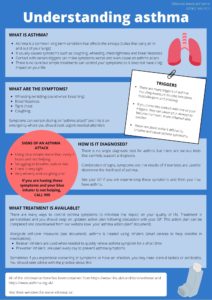What is asthma?
- Asthma is a common long-term condition that affects your airways (the tubes that carry air in and out of your lungs)
- It usually causes symptoms such as coughing, wheezing, chest tightness and breathlessness
- Contact with certain triggers and poor asthma control can make symptoms worse and even cause an asthma attack
- There is no cure but simple treatments can control your symptoms so it does not have a big impact on your life
What are the triggers?
There are many triggers of asthma including exposure to the cold, infections, dust/allergens and smoking. If you come into contact with one of your triggers, they can cause your airways to become narrower, inflamed and swollen. This can make it difficult to breathe and cause asthma symptoms.
What are the symptoms?
Many people with asthma experience symptoms such as:
- Wheezing (whistling sound when breathing)
- Breathlessness
- Chest tightness
- Coughing
These symptoms can worsen in an “asthma attack” and this is an emergency where you should seek urgent medical attention. Signs of an asthma attack include:
- Using a blue reliever inhaler more than every 4 hours and it is not helping
- Struggling to breathe, walk or talk
- Chest is very tight
- Very wheezy and coughing a lot
If you are having these symptoms and your blue inhaler is not helping, call 999.
How is asthma diagnosed?
There is no single diagnostic test for asthma, but there are various tests that can help support a diagnosis. A combination of signs, symptoms and the results of these tests are used to determine the likelihood of asthma.
You should see your GP if you are experiencing any of the above symptoms and think you may have asthma.
What treatment is available?
There are many ways to control asthma symptoms to minimise the impact on your quality of life. Treatment is personalised and you should keep an updated action plan following discussion with your GP. This action plan can be completed and downloaded from our website here.
General asthma management includes:
- Self-care measures – more information about this can be found here
- Reliever inhalers – used when needed to quickly relieve asthma symptoms for a short time
- Preventer inhalers – used every day to prevent asthma symptoms
Sometimes if you experience worsening of symptoms or have an infection, you may need steroids or antibiotics. You should seek advice from your doctor about this.
All of the information here has been obtained from NHS and Asthma UK websites. Visit their websites for more information. A short summary of this information can also be found here.

